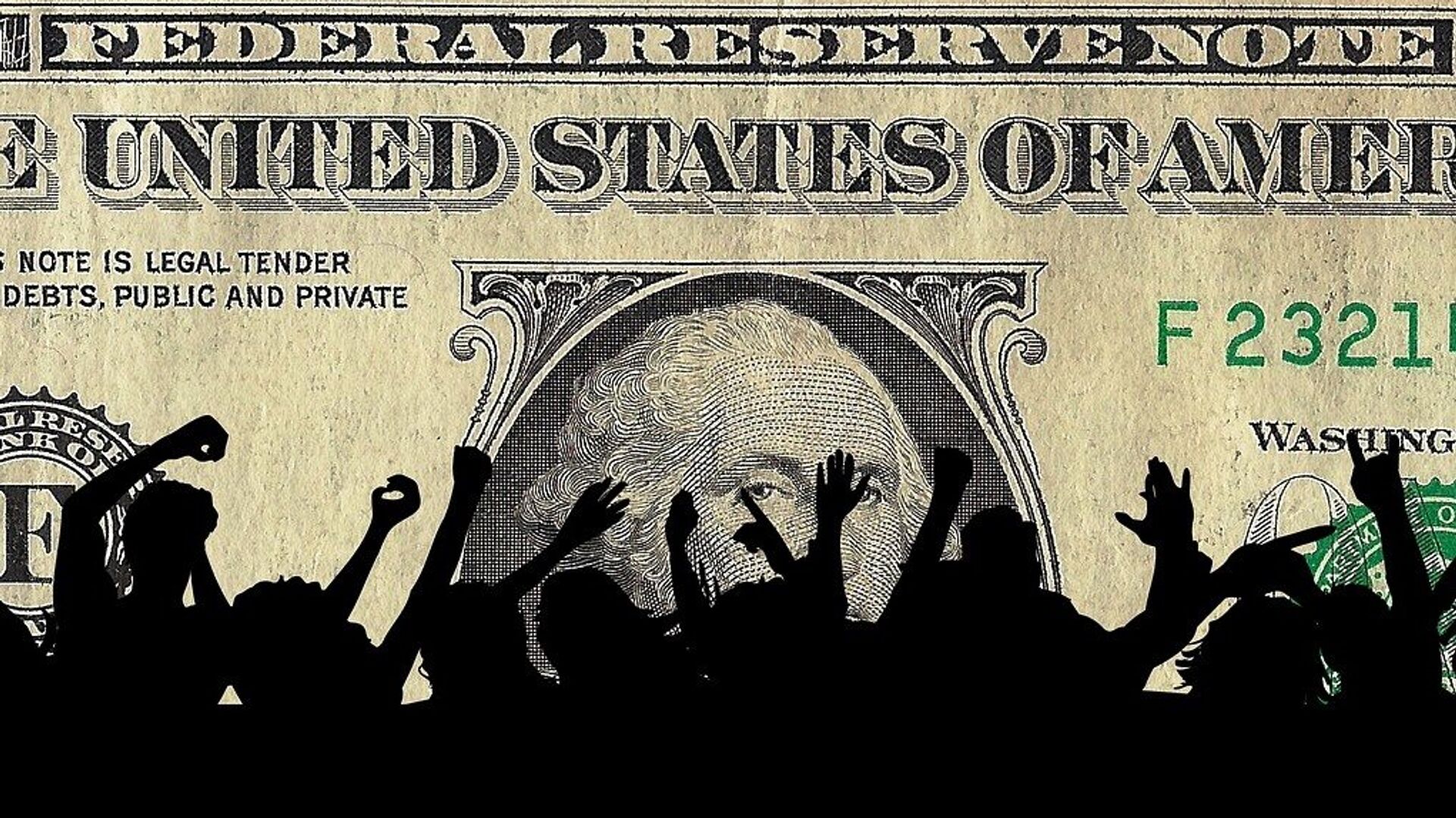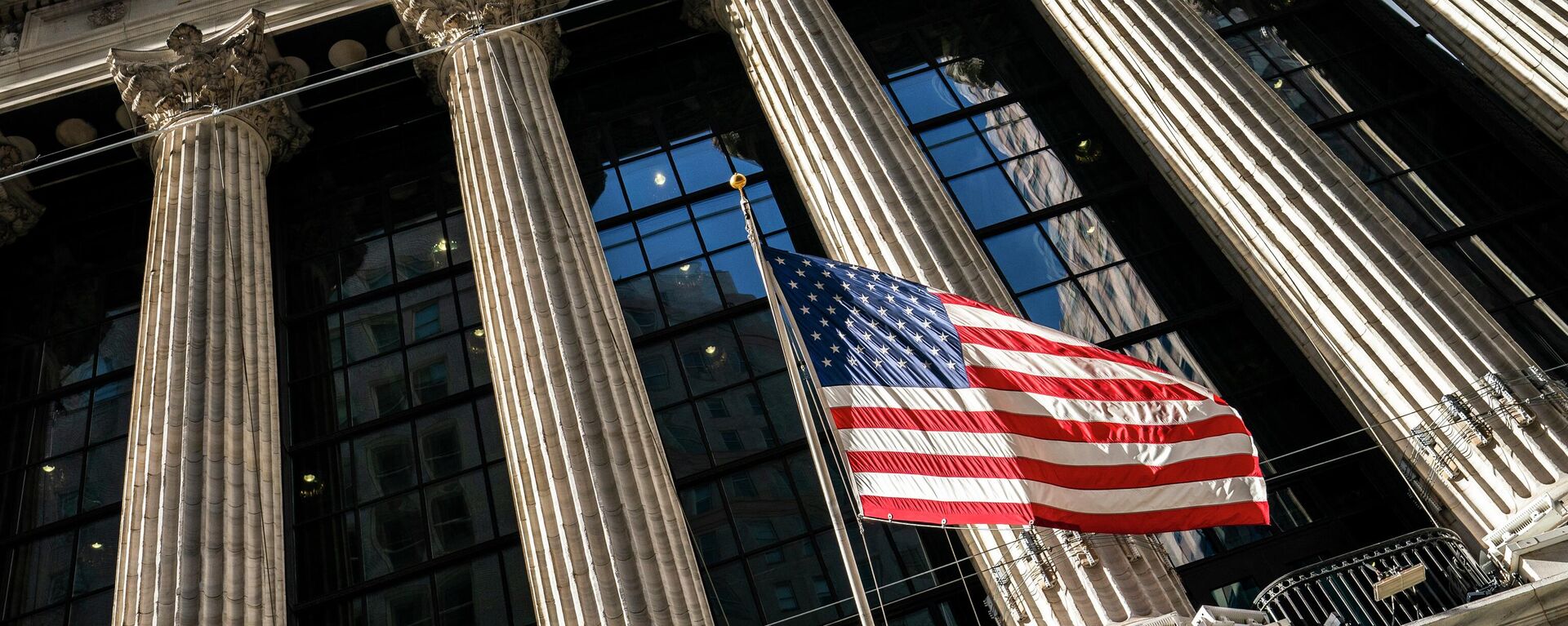https://sputnikglobe.com/20220705/recession-fears-ripple-through-the-economy-but-is-it-really-needed-to-curb-inflation-1096995021.html
Recession Fears Ripple Through The Economy, But Is It Really Needed To Curb Inflation?
Recession Fears Ripple Through The Economy, But Is It Really Needed To Curb Inflation?
Sputnik International
Last month the Federal Reserve Bank raised interest rates by 0.75%, the largest jump in rates since 1994. The move was intended to fight record-high inflation... 05.07.2022, Sputnik International
2022-07-05T22:51+0000
2022-07-05T22:51+0000
2023-03-05T10:46+0000
us
recession
joe biden
sputnik explains
dollar
https://cdn1.img.sputnikglobe.com/img/105071/15/1050711590_0:14:1021:588_1920x0_80_0_0_355412788e5197faec86039b9f0c5dd8.jpg
Fears of a recession have dominated the headlines and influenced everything from stock markets to oil prices. While President Joe Biden says a recession is not inevitable, more economic experts are starting to warn that it is.The S&P 500 has just finished its worst half-year performance since 1970, and Federal Reserve Chair Jerome Powell recently commented that the central bank is willing to allow a recession if it helps get prices under control. “The bigger mistake would be to fail to restore price stability,” Powell said in late June.While unemployment numbers remain low, there are other signs that the US economy is not as strong as the jobs report would seem to indicate. The economy shrank for the first three months of the year, and most indications point to that trend continuing for Q2. Job growth is rare in a shrinking economy, so Friday’s job report will be crucial in predicting where the economy will head next.In an attempt to curb the spike in prices, the Fed has already started to raise interest rates in an attempt to stabilize the prices of everything from food to energy costs to consumer goods. But some experts question if raising interest rates will have the desired effect, or if the Fed may be putting the United States on track to experience the double whammy of entering a recession while inflation continues to remain near record highs.Senator Elizabeth Warren, a Democrat from Massachusetts, fears that the underlying issues the Fed is trying to fix are outside of its control. At a hearing with Powell, she expressed her concerns. “Inflation is like an illness, and medicine needs to be tailored to the specific problem, otherwise you could make things a lot worse. And right now, the Fed has no control over the main driver of rising prices,” which she says are supply chain issues, Russia’s special military operation in Ukraine and the sanctions the West put on Russia in response to it.That concern is shared by Steve Keen, honorary professor of economics at University College London and the author of “Debunking Economics” and “The New Economics.” He says that central bankers don’t have experience in dealing with the type of inflation the United States is currently seeing.While Michael R. Englund, the principal director, and chief economist for Action Economics believes the Fed “has no choice” but to use what tools it has to combat inflation, he agrees that a recession may not be necessary. Englund predicts that the Fed will raise rates to the “slightly restrictive level” of 3.375% by the end of 2022, and then expects the central bank will keep rates at that level for 2023 unless we see a significant shrinking of the economy, in which case he expects some of the rate increases to be reversed.That is something Keen concurs with. “[Raising interest rates] will have a far more dramatic impact on the economy and on asset markets than they anticipate,” Keen explained. “So, I think they'll do two or three rises past the point where a recession begins. And then because the recession is much sharper than they expect, they will go into reverse and start reducing rates once more.”The threat of a recession may have an impact on how the United States responds to the situation in Ukraine, including sanctions on Russia. “I think they're still going to go ahead with those sanctions. And that, of course, will increase the [supply chain issues causing inflation] that the administration is trying to reduce,” Keen stated. “But what you may get is a more half-hearted attempt at sanctions, as, for example, with the European Union. As you know, in most of the sanctions, energy has been specifically excluded from those sanctions. Now, I've got to think a similar thing will happen with the Americans.”But with credit rates rising, Keen feels that a recession could come as early as later this year. He expects the rise in interest rates will cause credit-based demand to evaporate, which he likens to “slamming the brakes on the economy.”Keen further warns that “because rates are rising right now, we're likely to see negative credit turning up in America. And the only time, by the way, since 1945 that there was negative credit in the American economy was during the global financial crisis.”
https://sputnikglobe.com/20220705/recession-talk-grows-louder-in-us-as-economic-dowturn-expected-in-months-1096969229.html
Sputnik International
feedback@sputniknews.com
+74956456601
MIA „Rossiya Segodnya“
2022
News
en_EN
Sputnik International
feedback@sputniknews.com
+74956456601
MIA „Rossiya Segodnya“
Sputnik International
feedback@sputniknews.com
+74956456601
MIA „Rossiya Segodnya“
us, recession, joe biden, sputnik explains, dollar
us, recession, joe biden, sputnik explains, dollar
Recession Fears Ripple Through The Economy, But Is It Really Needed To Curb Inflation?
22:51 GMT 05.07.2022 (Updated: 10:46 GMT 05.03.2023) Last month the Federal Reserve Bank raised interest rates by 0.75%, the largest jump in rates since 1994. The move was intended to fight record-high inflation brought on by COVID-19-related spending, supply chain issues, and increased energy costs.
Fears of a recession have dominated the headlines and influenced everything from stock markets to oil prices. While President Joe Biden says a recession is not inevitable, more economic experts are starting to warn that it is.
The S&P 500 has just finished its worst half-year performance since 1970, and Federal Reserve Chair Jerome Powell recently commented that the central bank is willing to allow a recession if it helps get prices under control. “The bigger mistake would be to fail to restore price stability,” Powell said in late June.
While unemployment numbers remain low, there are other signs that the US economy is not as strong as the jobs report would seem to indicate.
The economy shrank for the first three months of the year, and most indications point to that trend continuing for Q2. Job growth is rare in a shrinking economy, so Friday’s job report will be crucial in predicting where the economy will head next.
In an attempt to curb the spike in prices, the Fed has already started to raise interest rates in an attempt to stabilize the prices of everything from food to energy costs to consumer goods. But some experts question if raising interest rates will have the desired effect, or if the Fed may be putting the United States on track to experience the double whammy of entering a recession while inflation continues to remain near record highs.
Senator Elizabeth Warren, a Democrat from Massachusetts, fears that the underlying issues the Fed is trying to fix are outside of its control. At a hearing with Powell, she expressed her concerns. “Inflation is like an illness, and medicine needs to be tailored to the specific problem, otherwise you could make things a lot worse. And right now, the Fed has no control over the main driver of rising prices,” which she says are supply chain issues, Russia’s special military operation in Ukraine and the sanctions the West put on Russia in response to it.
That concern is shared by Steve Keen, honorary professor of economics at University College London and the author of “Debunking Economics” and “The New Economics.” He says that central bankers don’t have experience in dealing with the type of inflation the United States is currently seeing.
“The inflation that central bankers have any experience in taming really was the 1970s and 80s period of inflation. And that was driven by very, very strong economic growth, which was largely credit-financed. Then you had a collapse in credit,” Keen said in an email to Sputnik. “Now what we're having instead is a situation where the demand was boosted by the government spending during COVID, that's a demand side factor, but predominantly it's the breakdown in the supply chain. And when you try to reduce demand using higher interest rates, you actually increase the cost of supply in several ways,” such as shipping.
While Michael R. Englund, the principal director, and chief economist for Action Economics believes the Fed “has no choice” but to use what tools it has to combat inflation, he agrees that a recession may not be necessary.
“The U.S. doesn’t necessarily need a recession to stop inflation, as a big chunk of outsized price gains over the last two years reflect supply chain bottlenecks and other disruptions that have lifted the prices for many products to unsustainable levels,” Englund explained to Sputnik, “Energy, building materials, and vehicles have current prices that are unsustainable, and we will likely see drop backs for these prices through 2023 regardless of whether the U.S. enters a recession.”
Englund predicts that the Fed will raise rates to the “slightly restrictive level” of 3.375% by the end of 2022, and then expects the central bank will keep rates at that level for 2023 unless we see a significant shrinking of the economy, in which case he expects some of the rate increases to be reversed.
That is something Keen concurs with. “[Raising interest rates] will have a far more dramatic impact on the economy and on asset markets than they anticipate,” Keen explained. “So, I think they'll do two or three rises past the point where a recession begins. And then because the recession is much sharper than they expect, they will go into reverse and start reducing rates once more.”
The threat of a recession may have an impact on how the United States responds to the situation in Ukraine, including sanctions on Russia. “I think they're still going to go ahead with those sanctions. And that, of course, will increase the [supply chain issues causing inflation] that the administration is trying to reduce,” Keen stated. “But what you may get is a more half-hearted attempt at sanctions, as, for example, with the European Union. As you know, in most of the sanctions, energy has been specifically excluded from those sanctions. Now, I've got to think a similar thing will happen with the Americans.”
But with credit rates rising, Keen feels that a recession could come as early as later this year. He expects the rise in interest rates will cause credit-based demand to evaporate, which he likens to “slamming the brakes on the economy.”
Keen further warns that “because rates are rising right now, we're likely to see negative credit turning up in America. And the only time, by the way, since 1945 that there was negative credit in the American economy was during the global financial crisis.”


